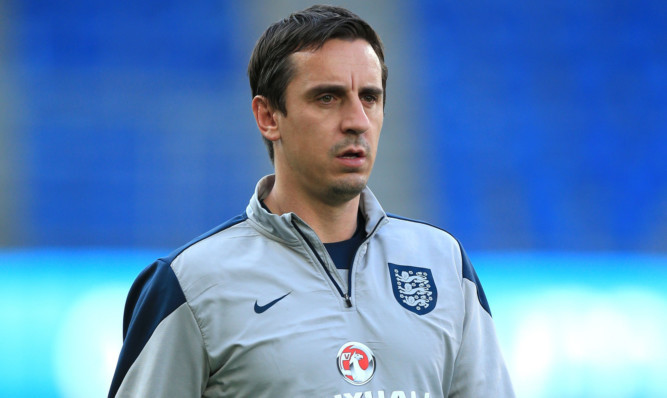
GARY NEVILLE believes that he’s been “chucked overboard” by the FA and that, because he’s “regarded as some kind of failure” he may never coach again.
The reality, Gary, is that you are a failure as a coach. You’ve had two jobs and two major disappointments.
And, to be accurate, you didn’t get chucked overboard by the FA, you jumped because you resigned.
Neville has been talking about his future, and the fact that he can’t see himself coaching for at least five years and maybe not at all.
For his four-month failure at Valencia he blames only himself, but for the fact that he’s no longer involved in the England set-up, he seems to blame FA chief executive Martin Glenn.
“The FA invested in me for four years,” he said. “I’m the most experienced I’ve ever been, yet you get chucked overboard.
“Of course, after Iceland you have to go, but the pathway of young coaches cannot be just based upon a run of defeats or victories, or else you’re ever-changing who you invest in.
“I’ve been to eight tournaments as a player and three as a coach.
“I’m only 41 years of age, and yet you’re regarded as a sort of failure.”
Neville can’t really complain about that. What happened at Valencia and with England was unexpected, considering how impressively he talks the game, but his record is there in black and white.
Taking a first managerial job with a big club in a foreign country without the language skills was a bold step, and perhaps illustrated Neville’s self-belief.
He ignored advice that it was too much, too soon. Even David Moyes, with 16 years’ managerial experience behind him, failed in Spain.
Still, he has to be credited for giving it a go, and he’d have probably been relatively untarnished had it not been for his association with Roy Hodgson’s ultimately disastrous England regime.
Hodgson presided over the two most disappointing tournaments in the history of disappointing tournaments and Neville was a major contributor. That’s what has hammered his reputation.
It wasn’t so long ago that he was being viewed as the next England manager.
Ideally, Hodgson would do well at the Euros, get a two-year contract extension, Neville would stay involved and then take over as boss after the World Cup in Russia, having done six years as a No. 2.
Gary believes that what happened in France shouldn’t have precluded him from remaining in the FA fold. That the bad times make you stronger.
He cites other national associations and clubs who, he implies, don’t ditch talent at the first sign of adversity.
“Holland have the solution, Ajax have the solution, Barcelona have the solution,” he says. “There are models out there. They create pathways and keep you on the pathway.”
I’m not sure they’re the best examples. Dutch international football is in a mess despite all those pathways, so are Ajax. And Barca coaches don’t generally come from a background of failure.
Neville wasn’t in charge of England but as a high-profile assistant, you are judged on your boss’s record.
Gary should be familiar with the concept. His brother Phil was Moyes’ number two at Manchester United, his pal Ryan Giggs was Louis van Gaal’s second-in-command. Both have been tainted by association.
The BBC have been showing the second series of Class Of ’92: Out Of Their League, that focuses on the involvement of the trio – with Paul Scholes and Nicky Butt – with National League North club, Salford City.
The title refers to the fact that, having been so successful as players, they are outside their comfort zone running a spit-and-sawdust non-League club.
Given what’s happened when they tried, it could be argued that they might be out of their league as top level coaches, too.
Of the five, only Butt is currently gainfully employed in the game – he’s the head of United’s youth academy.
The other four have gravitated into television work where you only have to talk the talk, not walk the walk.
Yet there’s no question that Gary Neville’s failure as a coach has detracted from the authority that has always been associated with his analysis.
In his first spell as a Sky Sports pundit, you believed every word he said. Now you’re not so sure.
READ MORE
Paul Lambert urges Scotland star Oliver Burke to immerse himself in German culture

Enjoy the convenience of having The Sunday Post delivered as a digital ePaper straight to your smartphone, tablet or computer.
Subscribe for only £5.49 a month and enjoy all the benefits of the printed paper as a digital replica.
Subscribe